-
Ingredients: wheat flour* (98%), sea salt. *Organically grown.
 Quick to cook and delicious in flavour, Organic Wide Udon Noodles are satisfying and versatile. Artisan family producers slowly air dry and mature these noodles to concentrate their flavour. They can be used all year round in a wide range of Asian and Western dishes, including piping hot noodles in broth, satisfyingly rich stir fries, and succulent summer salads.
Quick to cook and delicious in flavour, Organic Wide Udon Noodles are satisfying and versatile. Artisan family producers slowly air dry and mature these noodles to concentrate their flavour. They can be used all year round in a wide range of Asian and Western dishes, including piping hot noodles in broth, satisfyingly rich stir fries, and succulent summer salads.
Clearspring Japanese Noodles are made to traditional recipes, and are all egg-free and certified organic.
What makes them special:
- Firm, smooth noodles, satisfying and versatile
- Authentically made using the roll and cut method, not by the conventional force extruded method.
- Traditional, slow dried organic noodles from Japan. Dried at room temperature rather than artificially dried at 60-80 degrees.
- Takes 3 days to dry the noodles
- Cooks in 10 minutes
- Made from Semi wholewheat flour including the Aleurone layer which is rich in nutrients
- Low fat, source of protein and fibre
-
- Source of Protein
- Low in Saturated Fat
Nutritional Information
| Typical values |
g per 100g |
| Energy kJ: |
1454 |
| Energy kCal: |
343 |
| Fat: |
1.3 |
| of which saturates: |
0.3 |
| Carbohydrate: |
68 |
| of which sugars: |
4.9 |
| Protein: |
13 |
| Salt: |
1.8 |
Dietary Status
| Yeast Free |
| Kosher |
| Free of Added Alcohol |
For an explanation of the claims made above please click here
-
How to make Udon Noodles
To prepare bring 2L of water to the boil, add noodles (100g per serving) and stir. Simmer for 10 minutes then rinse briefly under cold water. Serve all year round in hot broths, stir-fries or chilled with a dipping sauce.
Recipes
Recipe Videos
-
Producer's Story
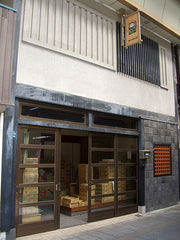 Our supplier has been producing Japanese dried noodles for over a century and celebrated its 100th anniversary in 2006.
Our supplier has been producing Japanese dried noodles for over a century and celebrated its 100th anniversary in 2006.
- 1906: Established
- 1971: Becomes a JAS certified (not JAS Organic) dried noodle factory
- 1973: Starts production of traditional Udon noodles
- 1994: Noodles selected as one of the 100 World Foods by New York Times
- 1999: Start production of organic products for export as an OCIA/Ecocert certified producer
- 2006: Celebrates its 100th anniversary
Production Process
 The key to the great tasting noodles is to allow plenty of time when mixing the dough and drying the noodles. They use a custom-made super mixer, which mixes the dough at low temperatures for an hour and a half which promotes rapid gluten formation. This process will create the firm texture the Japanese call “Koshi” and the finished product is similar in style to the very traditional hand-kneaded noodle (“Teuchi” udon).
The key to the great tasting noodles is to allow plenty of time when mixing the dough and drying the noodles. They use a custom-made super mixer, which mixes the dough at low temperatures for an hour and a half which promotes rapid gluten formation. This process will create the firm texture the Japanese call “Koshi” and the finished product is similar in style to the very traditional hand-kneaded noodle (“Teuchi” udon).
The drying process is also important and our producer uses a chain slow air dryer. This slowly air dries and matures the noodles to concentrate their flavour. Another advantage of using this type of dryer is that they can adjust the air speed for different kinds of noodles. Combined with their experience and craftsmanship, they are able to produce consistently good quality noodles throughout the year in different seasons, temperatures and humidity.
Nowadays the majority of noodle producers make production efficiency a priority – one whole day is usually enough to mix, dry and pack the noodles. In contrast, our producer spends 2 days on thin noodles (e.g. somen and soba), and 3 days on udon and this is just the time taken to dry them!!

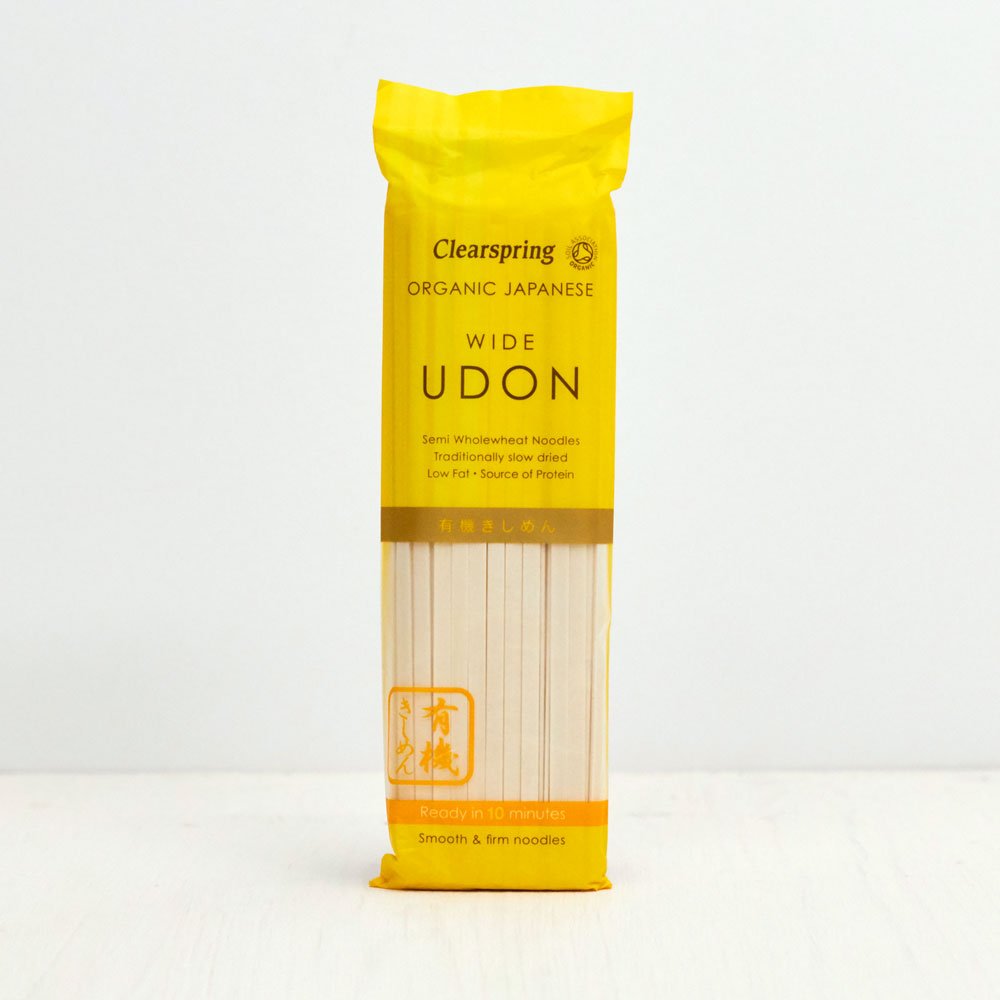
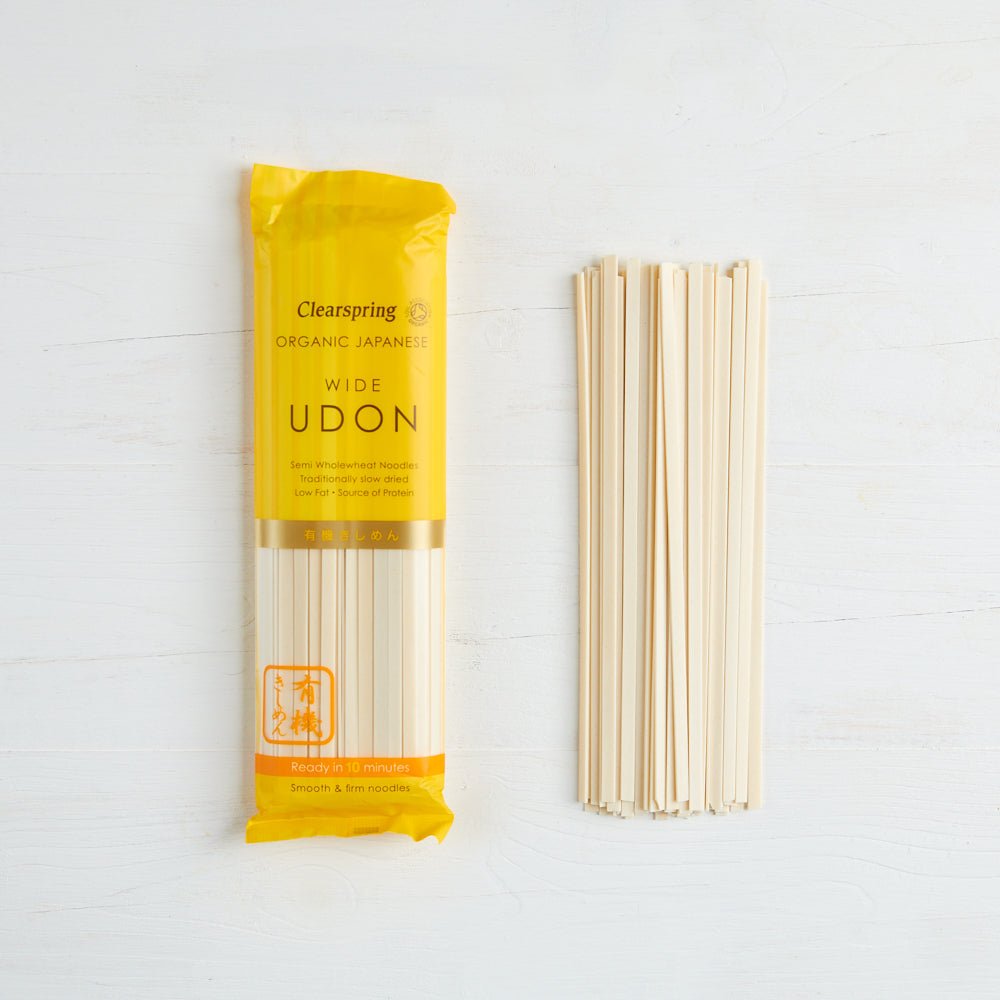
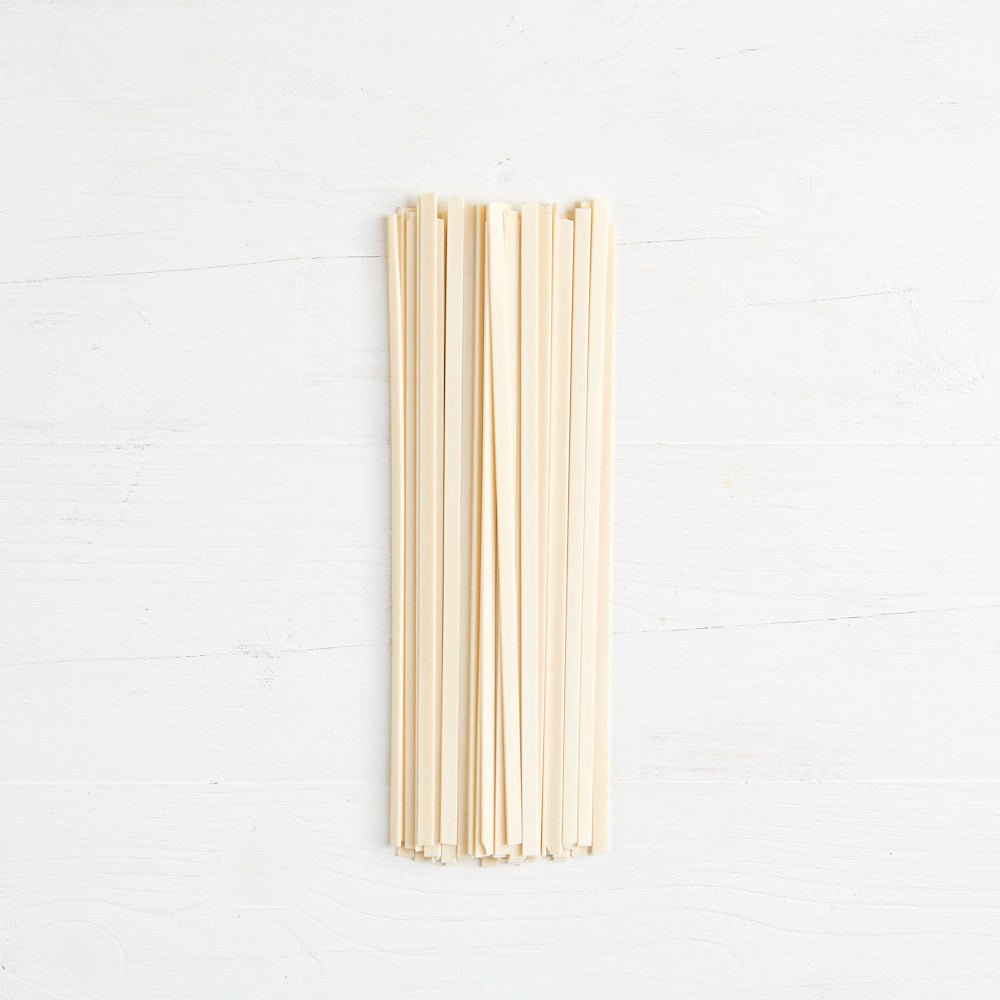
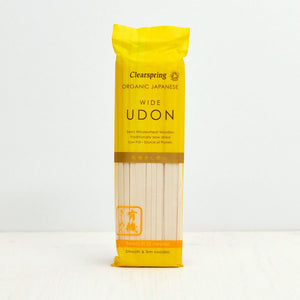
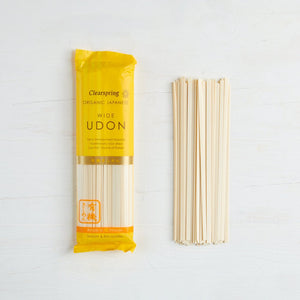
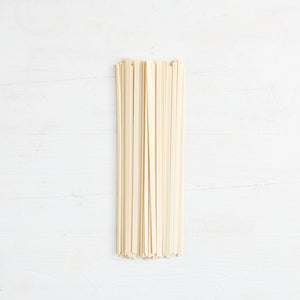
 Organic
Organic Kosher
Kosher Vegan
Vegan Quick to cook and delicious in flavour, Organic Wide Udon Noodles are satisfying and versatile. Artisan family producers slowly air dry and mature these noodles to concentrate their flavour. They can be used all year round in a wide range of Asian and Western dishes, including piping hot noodles in broth, satisfyingly rich stir fries, and succulent summer salads.
Quick to cook and delicious in flavour, Organic Wide Udon Noodles are satisfying and versatile. Artisan family producers slowly air dry and mature these noodles to concentrate their flavour. They can be used all year round in a wide range of Asian and Western dishes, including piping hot noodles in broth, satisfyingly rich stir fries, and succulent summer salads. Our supplier has been producing Japanese dried noodles for over a century and celebrated its 100th anniversary in 2006.
Our supplier has been producing Japanese dried noodles for over a century and celebrated its 100th anniversary in 2006. The key to the great tasting noodles is to allow plenty of time when mixing the dough and drying the noodles. They use a custom-made super mixer, which mixes the dough at low temperatures for an hour and a half which promotes rapid gluten formation. This process will create the firm texture the Japanese call “Koshi” and the finished product is similar in style to the very traditional hand-kneaded noodle (“Teuchi” udon).
The key to the great tasting noodles is to allow plenty of time when mixing the dough and drying the noodles. They use a custom-made super mixer, which mixes the dough at low temperatures for an hour and a half which promotes rapid gluten formation. This process will create the firm texture the Japanese call “Koshi” and the finished product is similar in style to the very traditional hand-kneaded noodle (“Teuchi” udon).